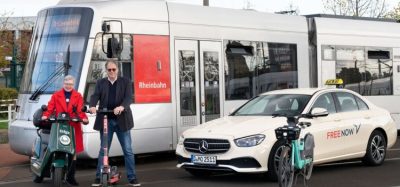eHailing, bike-sharing and integrated mobility to disrupt Latin America
- Like
- Digg
- Del
- Tumblr
- VKontakte
- Buffer
- Love This
- Odnoklassniki
- Meneame
- Blogger
- Amazon
- Yahoo Mail
- Gmail
- AOL
- Newsvine
- HackerNews
- Evernote
- MySpace
- Mail.ru
- Viadeo
- Line
- Comments
- Yummly
- SMS
- Viber
- Telegram
- Subscribe
- Skype
- Facebook Messenger
- Kakao
- LiveJournal
- Yammer
- Edgar
- Fintel
- Mix
- Instapaper
- Copy Link
Posted: 4 January 2018 | Intelligent Transport | No comments yet
Frost & Sullivan’s recent analysis reveals new business models in mobility will become the new growth engines of the Latin American transportation…


The Latin American market is rapidly embracing new mobility business models with a focus on an on-demand, integrated, multimodal mobility network, driven by changing demographics, preferences and technology.
A Frost & Sullivan report found that the overriding trends will lead to a fundamental change from vehicle ownership to vehicle usage. Mobility solutions such as eHailing, bike sharing and integrated mobility are experiencing significant growth following enthusiastic responses from consumers. In addition, municipalities are looking for ways to include new mobility services within public transport. Therefore it is vital for stakeholders in the transportation industry to develop innovative solutions to achieve sustainability.
Frost & Sullivan’s recent analysis, ‘Latin America New Mobility Business Models, Forecast to 2023’, part of their Global Mobility Growth Partnership Service programme, explored the market for, and the impact of, new business models in Latin America; analysing the growing trends in shared and integrated mobility toward 2023. The focus was on Argentina, Brazil, Chile and Mexico.
Key insights uncovered revealed that although mobility in Latin America is rapidly changing, there is still a heavy focus on traditional modes of transport and personal vehicle ownership. Analysis also showed that original equipment manufacturers had begun testing car-sharing pilots in 2016 and are expected to venture into offering mobility solutions by 2018.
The future of mobility in Latin America will be platform enabled, according to the report, offering seamless, flexible, first- to last-mile connectivity that is controlled by the customer and cost effective. The sharing economy was found to be a possible answer for value creation and addition, especially in times of volatile economics. Between 2016 and 2023, bike sharing is expected to experience a 100 per cent growth in bike volumes, while the car-sharing fleet is set to experience a tenfold increase.
“Wide-scale disruption with the entry of new mobility business models is heavily impacting traditional market structures. This leads to changes in regulations, investments and market structures,” said Yeswant Abhimanyu, Latin America Mobility Research Manager. “It is vital for stakeholders to discuss how these new solutions, aimed at the better use of existing structures, can be included successfully. In addition, investment in infrastructure in order to enable more integrated and cost-effective services is pivotal. Infrastructure is the bedrock of a well-functioning mobility.”
Related topics
Business Models, Fleet Management & Maintenance, Infrastructure & Urban Planning, Mobility Services, Multimodality
Related modes
Bikes & Scooters, Bus & Coach, Taxi
Related cities
Latin America
Related organisations
Frost and Sullivan
Related people
Yeswant Abhimanyu







